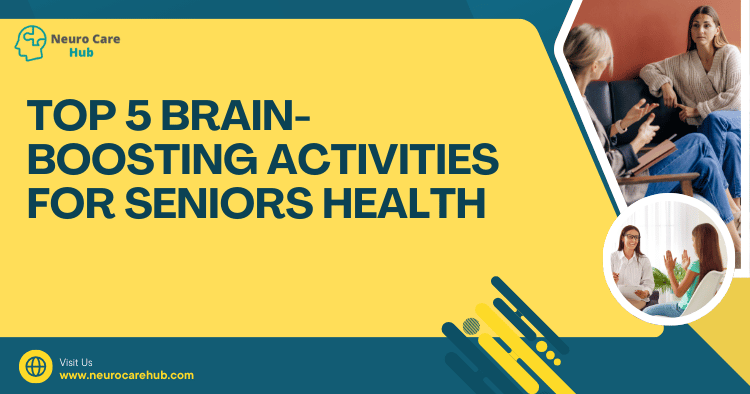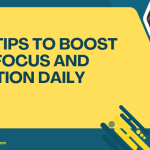Table of Contents
- Introduction
- 1. Puzzles and Games
- 2. Reading and Writing
- 3. Art and Craft Projects
- 4. Physical Exercise
- 5. Socializing and Group Activities
- Conclusion
- FAQs
Introduction
As we age, maintaining cognitive health becomes increasingly important. Engaging in brain-boosting activities can enhance memory, improve focus, and even stave off cognitive decline. Recent studies in 2024 and 2025 emphasize the importance of these activities in promoting brain health in seniors. This blog explores five effective activities that can help seniors keep their minds sharp while enjoying life to the fullest. Let’s dive into these enriching activities!
1. Puzzles and Games
Puzzles and games are not just entertaining; they are fantastic tools for cognitive health. Whether it’s jigsaw puzzles, crossword puzzles, or board games like Scrabble, these activities challenge the brain and improve problem-solving skills.
Benefits:
- Enhanced Memory: Engaging in puzzles improves memory retention and recall.
- Mental Agility: Games require strategy and quick thinking, enhancing mental agility.
- Stress Relief: These activities can also be a great way to unwind and reduce stress.
Recommended Games:
| Game Type | Description | Where to Find |
|---|---|---|
| Crossword Puzzles | Word games that challenge vocabulary | NY Times Crossword |
| Sudoku | Number placement puzzles | Sudoku.com |
| Jigsaw Puzzles | Picture assembly puzzles | Local stores or Puzzle Warehouse |
For more insights on cognitive engagement, check out Top 5 Essential Insights on Neuro Care You Need to Know.
2. Reading and Writing
Reading and writing are two powerful ways to stimulate the mind. Whether you enjoy novels, newspapers, or poetry, reading keeps your brain engaged. Writing, on the other hand, helps organize thoughts and improves cognitive function.
Benefits:
- Vocabulary Expansion: Regular reading exposes you to new words and ideas.
- Cognitive Engagement: Writing can improve critical thinking and creativity.
- Stress Reduction: Both activities can serve as a form of escapism, reducing stress.
Tips for Getting Started:
- Join a book club to discuss literature and meet new friends.
- Keep a daily journal to express thoughts and emotions.
For more on the benefits of reading, check out this resource from Harvard Health Publishing.
3. Art and Craft Projects
Engaging in arts and crafts can boost creativity and provide a sense of accomplishment. Painting, knitting, or scrapbooking are excellent ways to express oneself while enhancing cognitive abilities.
Benefits:
- Fine Motor Skills: Crafting activities improve dexterity and coordination.
- Creative Expression: Allows for personal expression, which can be therapeutic.
- Social Opportunities: Group art classes can foster social connections.
Suggested Projects:
| Project Type | Description | Materials Needed |
|---|---|---|
| Painting | Create artwork using watercolors or acrylics | Paints, brushes, canvas |
| Knitting | Craft scarves, hats, or blankets | Yarn, needles, patterns |
| Scrapbooking | Compile memories in a creative format | Photos, paper, embellishments |
4. Physical Exercise
Physical activity is not only great for the body but also for the brain. Regular exercise increases blood flow to the brain and promotes neurogenesis, which is the formation of new neurons.
Benefits:
- Improved Mood: Exercise releases endorphins, leading to a happier mood.
- Enhanced Cognitive Function: Activities like walking, swimming, or yoga can improve memory and mental clarity.
- Social Engagement: Group classes or walking clubs can help build social connections.
Recommended Exercises:
| Exercise Type | Description | Recommended Frequency |
|---|---|---|
| Walking | A low-impact aerobic activity | 30 minutes, 5 times a week |
| Yoga | Mindfulness and flexibility | 2-3 times a week |
| Tai Chi | Gentle martial art focusing on balance | 1-2 times a week |
For more insights into the importance of regular check-ups and early intervention, see Top 5 Benefits of Early Intervention in Neuro Care.
5. Socializing and Group Activities
Social interaction is crucial for emotional well-being and cognitive health. Participating in group activities, whether it’s a community class, volunteering, or simply spending time with friends, can provide mental stimulation and combat loneliness.
Benefits:
- Boosted Motivation: Being around others can encourage continued engagement in brain-boosting activities.
- Enhanced Communication Skills: Regular interactions can improve verbal skills and confidence.
- Emotional Support: Building a support network can reduce feelings of isolation.
Ideas for Group Activities:
- Join local clubs, such as gardening or book clubs.
- Participate in community service projects.
- Attend workshops or classes at community centers.
Explore more about how family support enhances neuro care in Top 5 Ways Family Support Enhances Neuro Recovery.
Conclusion
Incorporating brain-boosting activities into your daily routine can significantly enhance cognitive health and overall well-being for seniors. Whether it’s solving puzzles, reading, engaging in creative projects, exercising, or socializing, there’s something for everyone. Remember, the key is to stay active and keep your mind engaged!
FAQs
Q: How often should seniors engage in brain-boosting activities?
A: Aim for at least 30 minutes of brain-stimulating activities each day to reap the benefits.
Q: Are there any online resources for seniors to find activities?
A: Yes! Websites like SeniorPlanet.org offer a variety of online classes and resources tailored for seniors.
Q: Can these activities really improve cognitive health?
A: Absolutely! Numerous studies have shown that engaging in mentally stimulating activities can delay cognitive decline and improve brain health.
Q: What if I have mobility issues?
A: Many brain-boosting activities can be adapted for limited mobility. Consider seated exercises, chair yoga, or online classes that can be done from home.
By incorporating these activities into your life, you can enjoy a vibrant and fulfilling senior experience. So, gather your friends, pick up a puzzle, or start a new creative project today! For more insights on neuro care and related topics, explore Neuro Care Hub.






